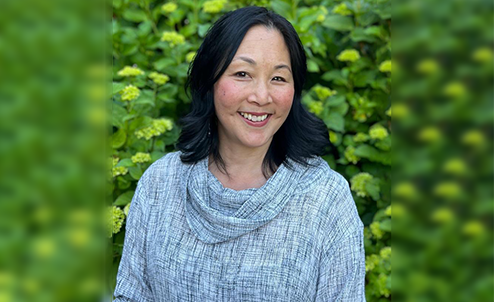
*Carolyn is currently seconded to Langara's Applied Research Centre (ARC).
Hello! My name is Carolyn Wing and I use the pronouns she/her for myself.
I am 3.5 generation Chinese-Canadian. My maternal grandmother was born in Cumberland on Vancouver Island and my other three grandparents emigrated from Guangzhou, China which is the city formerly named Canton by colonizers (therefore we are Cantonese). Apparently, my true surname is Ng but when my paternal grandfather arrived in Canada it was recorded as Wing so similarly to many immigrants, we had to sort out the true last name business in later generations.
My roots
My maternal grandparents were segregated in Vancouver’s Chinatown and my mother, and her siblings were born in a house in that neighbourhood. When my paternal grandparents immigrated to Canada, my grandfather insisted that my grandmother renounce everything Chinese and become a Methodist. My grandmother was able to hide a few pieces of Chinese jewelry and a dress in her trunk from China before they sailed off to settle in Kamloops, BC.
My grandfather started out as a domestic servant but was able to eventually purchase property, a farm with orchards, and run a grocery store. My father and his siblings, born from about 1920-1930, were perhaps part of the first generation of the model minority. It is documented that my uncle Peter Wing was groomed by the church and groups such as the Lions and Soroptimist Clubs to demonstrate that “the Chinese” were model citizens and could assimilate. Indeed, he was successful as in the 1960’s he was elected mayor of the city of Kamloops and was the first mayor in North America of Chinese ancestry. There haven’t been that many since!
My parents both faced racism and discrimination in the early years of their professions. My father was one of the first practicing Chinese Canadian pharmacists. He was forced to leave his home and travel to small communities like Dawson Creek and Prince George in the 1950’s for work as no one would hire him in Vancouver. My mother, born in 1933, was unable to find employment in Vancouver as a teacher for several years until eventually she became the third Chinese-Canadian teacher to be hired in the Vancouver School district in the 1950s.
People of Chinese ancestry, even those born in Canada were not considered Canadian Citizens until 1947. Therefore, my father, who was born in Kamloops, BC in 1925 was not considered a Canadian Citizen until he was 22 years old!
In society
I grew up in an upper middle class neighborhood in Vancouver on the unceded traditional and contemporary territories of the xʷməθkʷəy̓əm (Musqueam), Sḵwx̱wú7mesh (Squamish), and səlilwətaɬ (Tsleil-Waututh) Nations.
Despite always living in the lower mainland and deeply valuing this amazing part of the Earth and being grateful to the ancestral stewards of it, I still do not feel a sense of place here. I attribute this to being part of the diaspora of Chinese Canadians – I still don’t really fit here but I definitely don’t fit in China either! I do not speak Mandarin or Cantonese and practice mostly only food aspects of Chinese-Canadian culture.
Despite this lack of feeling a sense of place, being a woman and still being considered a visible minority, I definitely have more privilege than most. I am CIS gender, heterosexual, middle class, a property owner, and an English speaker with a secure full-time position of employment and a pension!
My work
I am a permanent part-time faculty in the Early Childhood Education department and a permanent part- time consultant in the Office of Equity, Diversity, and Inclusion. Currently, I am seconded to the Applied Research Centre as I work on a research project funded by Employment and Social Development Canada entitled, Innovating Virtual Reality in Inclusive and Anti-biased ELCC Training.
Early Childhood Education is a field that has always had a social justice focus. The sector has advocated for inclusive free education and childcare for all as well as pay equity to a workforce that is dominated by women and more commonly now, immigrant women. My current project looks at how new technology can support our college students’ learning to become socially just early childhood educators through developing empathy and anti-biased and anti-racist actions within their practice with young children.